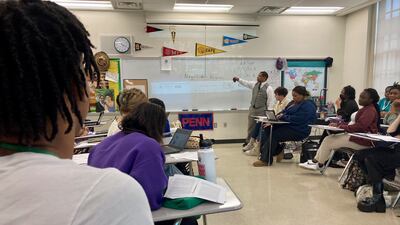What was supposed to be an exciting new high school course on black culture and history in America has become the latest target in the country's ever-worsening culture wars.
The College Board's Advanced Placement course on African-American studies, unveiled on Wednesday, has come under fire from conservatives for being too “woke”.
Academics are furious, too, after the College Board yielded to right-wing demands and watered the course down following a threat from Florida Governor Ron DeSantis, who said he would ban the course from the southern state's high schools as it was “contrary to Florida law”.
The course's framework, which was released on the first day of Black History Month, studies the origins of the African diaspora, enslavement, freedom and resistance, among other topics.
Noticeably absent from the curriculum, however, is the Black Lives Matter movement, queer theory and critical race theory, an academic concept that looks at how race and law intersect in America.
The framework did, however, provide BLM: Origins, Impacts, Critics as one optional independent sample project topic.
The College Board has defended the course, currently being taught under a pilot programme at 60 schools across the country, and said that the final curriculum had nothing to do with comments made by Mr DeSantis.
“This course hides from nothing, it sees everything,” David Coleman, chief executive of College Board, told CBS.
But many academics disagree.
“It is really unfortunate that one governor out of 50 states has seemingly bullied the College Board into changing [the] curriculum, and I find that to be incredibly troubling,” said LaToya Baldwin Clark, an assistant professor at the University of California, Los Angeles School of Law.
They fear the stripped-down curriculum may fail to adequately prepare pupils for higher education and the real world.
“It's making it less likely that students nationally will have the best training available to advance their studies," said Khalil Gibran Muhammad, a professor of history, race and public policy at the Harvard Kennedy School.
“If they show up at college and decide they want to pursue graduate studies, they will come with deficits because material will have been stripped from the core tenants of the field.”
Advanced Placement courses are geared towards high-achieving pupils looking to gain credits towards a university degree.
Mr Muhammad, who acknowledged he had not reviewed the entirety of the 200-plus page framework, said he found it particularly “absurd” that the works of Ta-Nehisi Coates, a prominent American author, had not been included in the curriculum, among others.
“I just want to emphasise that the removal of those writers is an egregious gutting of what this curriculum should be, regardless of how DeSantis has framed this issue or any other future governor who will weigh in on this point,” he told The National.

Mr DeSantis, widely believed to be a leading candidate for the Republican ticket in the 2024 presidential election, has been a vocal critic of what he views as the liberalisation of America’s educational system.
He recently proposed a plan to block Florida state colleges and universities from providing diversity, equity and inclusion programmes, a move that has sparked widespread condemnation among academics.
“In Florida, we will build off of our higher education reforms by aligning core curriculum to the values of liberty and the western tradition, eliminating politicised bureaucracies like DEI, increasing the amount of research dollars for programmes that will feed key industries with talented Florida students,” Mr DeSantis said in a statement.
Both Mr Muhammad and Ms Baldwin Clark find Mr DeSantis’s views towards education deeply unsettling.
“What is so troubling about this moment, it is obvious that DeSantis is trying to dismantle these fields to render them illegitimate by taking over the Florida system by weakening the higher education system,” said Mr Muhammad.
Ms Baldwin Clark added: “He’s the one who is trying to indoctrinate children into a way of thinking about the world that doesn't give them access to other ideas and other frameworks.”
Education has become a hot-button issue in the US and appears poised to be a central issue in the next election cycle.
Mr DeSantis, who recently won re-election in Florida by nearly 20 points, has made it a major part of his agenda and seems to be tapping into conservative parents' fears.
Though free speech is enshrined under the First Amendment of the US Constitution, this does not always extend to the classroom: Over the years, school boards have banned books from libraries deemed disagreeable or offensive.


